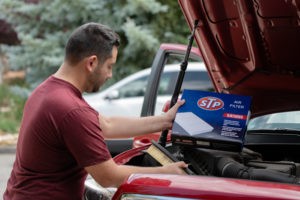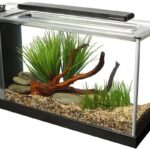Your car’s engine air filter is a crucial component designed to protect the engine by preventing contaminants from entering. Constructed from pleated materials, often a mix of natural and synthetic fibers, and sometimes reinforced for durability, these filters are engineered to trap microscopic particles, as small as 5 or 10 microns. This filtration process is vital to prevent engine damage and maintain optimal performance. Simultaneously, the filter must allow unrestricted airflow to the engine, ensuring efficient combustion.
Over time, engine air filters naturally become clogged with debris, diminishing their effectiveness. Regular replacement is therefore essential to maintain your vehicle’s health. A general guideline suggests replacing your car’s air filter every 12 months or 12,000 miles. However, driving conditions significantly impact filter lifespan. If you frequently drive in stop-and-go traffic or in areas with high dust or pollution levels, more frequent changes are necessary. For budget-conscious car owners, replacing the air filter is a straightforward DIY task. Simply ensure you purchase the correct filter for your vehicle model and follow the provided instructions for a seamless replacement.
Cabin air filters, responsible for cleaning the air inside your car’s passenger compartment, require similar attention. These filters, much like engine air filters, trap environmental contaminants such as bugs, dirt, pollen, leaves, and other airborne particles. Additionally, cabin air filters can become damp, leading to mold or mildew growth, which can cause unpleasant odors within your vehicle. Adhering to an annual replacement schedule for cabin air filters is a proactive measure to ensure fresh and clean cabin air.
 stp air filter being installed into truck
stp air filter being installed into truck
Recognizing When to Replace Your Air Filter
Beyond the standard time and mileage recommendations, certain symptoms can indicate that your air filters need attention. Recognizing these signs can prevent potential issues and maintain your vehicle’s performance.
Symptoms of a Clogged Engine Air Filter
A dirty engine air filter can trigger a range of issues affecting your vehicle’s performance and reliability. These symptoms include:
- Reduced Fuel Economy: A clogged filter restricts airflow, forcing the engine to work harder and consume more fuel.
- Engine Misfires: Insufficient air can disrupt the air-fuel mixture, leading to engine misfires and rough running.
- Increased Emissions: Inefficient combustion due to poor airflow can result in higher emissions.
- Hissing Noise at Idle: A whistling or hissing sound from under the hood can sometimes indicate restricted airflow due to a blocked filter.
- Potential Engine Damage: Ignoring a severely clogged filter can lead to long-term engine problems due to increased strain and contaminant entry.
- Check Engine Light Activation: In some cases, a dirty air filter can trigger the Check Engine Light.
- Rough Idling: The engine may idle unevenly or roughly due to improper air intake.
- Slow Acceleration: Restricted airflow can hinder engine responsiveness and acceleration.
Being attentive to these warning signs enables you to proactively maintain a clean air filter, ensuring smooth engine operation and optimal vehicle performance.
Signs of a Dirty Cabin Air Filter
Cabin air filters play a vital role in your vehicle’s ventilation system, maintaining clean and healthy air within the cabin by filtering out pollen, dust, and other airborne pollutants. However, cabin filters become less effective as they accumulate dirt and debris, potentially degrading cabin air quality. Signs that your cabin air filter needs replacement include:
- Decreased Cabin Air Quality: You might notice more dust or allergens inside the car, or experience increased allergy symptoms while driving.
- Unpleasant Odors from Vents: A musty, stale, or even rotten smell emanating from the vents can indicate a contaminated cabin air filter.
- Reduced Airflow from Vents: If the air blowing from your dashboard vents is noticeably weaker, a clogged filter could be the cause.
Step-by-Step Guide to Air Filter Replacement
Replacing both engine and cabin air filters is typically a straightforward task, often requiring minimal tools. In many cases, no tools are needed at all, while some vehicles might require a simple screwdriver to access the filter housing.
Replacing Your Engine Air Filter
Replacing your engine air filter is a simple DIY task achievable with basic skills. In most vehicles, the engine air filter is located within the engine bay, housed in a rectangular box.
- Locate the Air Filter Housing: Open your car’s hood and find the rectangular air filter housing, usually made of plastic and often marked with clips or screws.
- Open the Housing: Unclip or unscrew the housing cover to access the air filter.
- Remove the Old Filter: Carefully remove the old air filter, noting its orientation for correct installation of the new filter.
- Dispose of the Old Filter: Dispose of the used filter responsibly. Many auto parts stores offer recycling programs for used filters.
- Install the New Filter: Place the new air filter into the housing, ensuring it matches the orientation of the old filter.
- Close the Housing: Securely close the air filter housing cover, ensuring it is properly clipped or screwed back into place.
Regular engine air filter replacement contributes to maintaining engine efficiency and prolonging engine life.
Replacing Your Cabin Air Filter
Cabin air filter replacement is generally a simple procedure, though the exact location and steps can vary depending on your vehicle’s make and model. Common locations for the cabin air filter include behind the glove compartment or under the dashboard.
- Locate the Cabin Air Filter Housing: Consult your vehicle’s owner’s manual to pinpoint the exact location of the cabin air filter. It is often behind the glove box, which may need to be partially or fully removed for access. In some vehicles, it might be accessible from under the hood, near the windshield.
- Access the Filter: Open the access panel or remove the glove compartment as needed to reveal the cabin air filter housing.
- Remove the Old Filter: Slide out the old cabin air filter, noting its direction for correct installation of the new one.
- Install the New Filter: Insert the new cabin air filter into the housing, ensuring it is oriented correctly as indicated by arrows on the filter frame or housing.
- Reassemble Components: Reinstall the glove compartment (if removed) or close the access panel securely.
Replacing your cabin air filter regularly ensures a fresher and healthier environment inside your vehicle.
For convenient air filter replacement, visit an AutoZone near you to purchase the correct filter and breathe easier. Unsure which filter fits your car or still wondering about replacement frequency? Utilize the vehicle information tool online or consult with an AutoZone associate for expert guidance.
If you prefer professional assistance, AutoZone’s Shop Referral Program can connect you with qualified mechanics in your area.
Frequently Asked Questions
How do I know when my air filter needs replacement?
Signs of a dirty engine air filter include rough engine running, decreased fuel economy, and potentially the Check Engine Light. A clogged cabin air filter often manifests as reduced airflow from the vents or unpleasant smells.
What is the typical lifespan of a car air filter?
A car air filter generally lasts for approximately one year or 12,000 miles (around 19,312 kilometers).
What is the average cost of an air filter?
The average air filter price ranges from $10 to $25, although specialized filters can exceed $100.
How can I inspect my car’s air filter?
Hold the air filter up to a light source. If light cannot penetrate through the pleats, the filter is likely dirty and requires replacement.
Is an engine filter the same as an air filter?
“Engine filter” is a type of air filter. However, “engine filter” can also refer to an oil filter, while “air filter” can also refer to a cabin air filter. Context is crucial for understanding.
Will replacing my air filter improve car performance?
If your engine air filter is significantly dirty, replacing it can certainly help restore your vehicle’s original performance levels.
